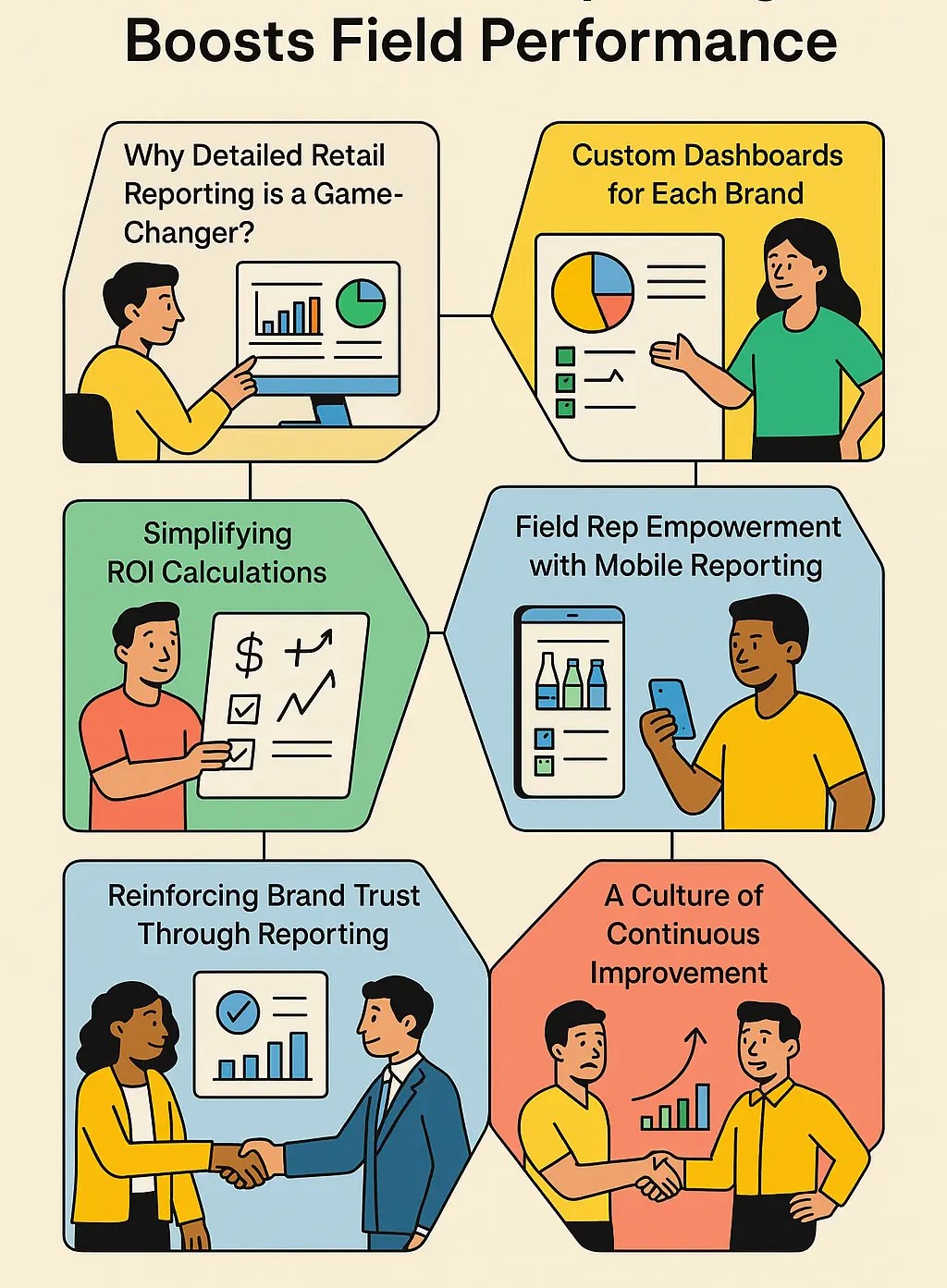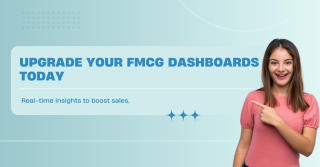Detailed Retail Reporting that Boosts Field Performance

In the fast-paced world of retail, visibility and timing are everything. To thrive, brands and retail service providers must ensure their products are well-placed, in stock, and promotion-ready. Detailed retail reporting is becoming the backbone of smarter decision-making in retail execution, helping teams shift from reactive to proactive strategies that drive in-store success.
Let’s explore how modern retail teams are leveraging detailed analytics and reporting tools to gain clarity, improve performance, and exceed client expectations.
Why Detailed Retail Reporting is a Game-Changer?
Detailed retail reporting bridges the gap between data collection and actionable insights. Rather than simply tracking visits or check-ins, advanced dashboards now empower teams with real-time insights into shelf status, promotion execution, sales rep productivity, and return on investment.
Retail analytics dashboards take complex data and translate it into digestible, visually appealing reports that field teams and brand managers can use to make faster, more informed decisions. This level of clarity doesn’t just drive execution—it strengthens client trust and showcases the value of your services.
Real-World Impact: From Visibility to Accountability
One retail service provider operating across North America transformed its operations by integrating an advanced retail execution platform with detailed retail reporting. After briefly exploring alternative solutions, they returned to their original software partner, seeking better usability, a cleaner user interface, and unmatched analytics support.
Since re-implementation, they’ve unlocked new potential in their operations:
-
Real-time insights into SKU-level performance
-
Custom dashboards tailored to individual brand partners
-
Simplified win-tracking to easily demonstrate success
This kind of clarity allows retail teams to answer critical questions like:
-
Which products are winning on the shelf?
-
How effective are ongoing promotions?
-
Are we meeting each brand’s KPIs?
-
What ROI are we delivering per campaign?

Custom Dashboards for Each Brand
One size never fits all in retail. That’s why detailed retail reporting systems offer the ability to build custom dashboards for each brand or product category. These dashboards are designed to reflect what matters most to the client, whether that’s:
-
On-shelf availability
-
Planogram compliance
-
Display execution
-
Promotion effectiveness
By visualizing wins, gaps, and trends, field teams can align their strategies with brand priorities and show clear value with every report.
Simplifying ROI Calculations
To further optimize reporting, this retail merchandising team developed an internal ROI tracker that calculates service costs versus performance outcomes for each client. Now, instead of spending hours explaining line items, they provide clients with a clear summary of results, highlighting every win and the related investment.
This has not only improved transparency with brands but also helped strengthen long-term partnerships through data-backed accountability.
Field Rep Empowerment with Mobile Reporting
Field reps are at the heart of execution, and their ability to collect data quickly and accurately is key. Mobile-first retail execution platforms now allow reps to:
-
Snap shelf photos
-
Log promotion compliance
-
Capture SKU-level availability
-
Report display conditions
All this data is then funneled into centralized dashboards where performance can be tracked in real time. Empowered reps, combined with detailed reporting, result in stronger execution and more agile responses when things go off track.
Reinforcing Brand Trust Through Reporting
For retail execution partners, reporting isn’t just an internal tool—it’s a client-facing asset. Accurate, detailed retail reporting strengthens client relationships by:
-
Demonstrating accountability
-
Proving the value of in-store efforts
-
Making brand performance easy to understand
Whether you’re working with CPG giants or niche brands, giving them easy-to-read, data-rich dashboards builds confidence and fosters transparency.
A Culture of Continuous Improvement
Advanced reporting capabilities also promote a culture of continuous improvement. Teams can:
-
Compare performance across regions or reps
-
Identify low-performing SKUs or stores
-
Adjust strategies quickly based on real-time feedback
This data-first approach encourages teams to not just do the work, but to improve how they do it, every day.
Conclusion: Turning Data into Retail Results
Detailed retail reporting is no longer a nice-to-have—it’s a must for any brand or merchandising team looking to scale, streamline, and succeed in the modern marketplace.
By combining on-the-ground data with intelligent dashboards, retail teams gain a powerful edge. They’re able to track wins, share insights with brands, and adapt quickly to new challenges—all while proving their value in every report.
When performance matters, data is the differentiator. And with detailed retail reporting, that performance is always in sight.
❓ FAQs: Detailed Retail Reporting in Retail Execution
Q1. What is detailed retail reporting?
A: Detailed retail reporting refers to the process of collecting, analyzing, and visualizing retail execution data, such as shelf conditions, stock availability, and promotion compliance, into actionable insights. These reports help brands and retail teams optimize in-store performance.
Q2. How does detailed reporting improve field team performance?
A: It gives field reps real-time feedback on their execution, helps them identify issues early (like out-of-stock items or poor displays), and enables more targeted action. It also promotes accountability and data-driven decision-making on the ground.
Q3. Can custom dashboards be created for each brand?
A: Yes. Most modern retail reporting tools allow teams to build custom dashboards tailored to each brand’s KPIs, such as planogram compliance, display execution, or on-shelf availability, ensuring reporting aligns with client priorities.
Q4. What kind of data can field reps collect using mobile tools?
A: Field reps can collect data such as shelf photos, SKU availability, promotion execution status, display compliance, and more, all from their mobile devices. This information is synced in real-time to centralized dashboards for instant analysis.
Q5. How does reporting help build brand trust?
A: Transparent and accurate reports demonstrate accountability, showcase campaign effectiveness, and make brand performance easy to track. This builds stronger relationships and reassures clients that their investments are delivering results.
Q6. What role does ROI tracking play in retail reporting?
A: ROI tracking calculates the relationship between service costs and performance outcomes. It helps retail service providers quantify their value to clients, making it easier to justify budgets and foster long-term brand partnerships.
Q7. Is detailed reporting only useful for large brands?
A: No. Both large CPG companies and niche or emerging brands benefit from detailed reporting. It helps all teams understand performance drivers, identify growth opportunities, and execute more effectively.
🔍 Also Check
👉 Enhance Leadership Visibility And Team Success In Retail
👉 Strong Retail Teams Drive Success: Key Strategies For Growth
🌟See What Users Say About Us!
Delta Sales App, trusted by businesses for streamlining sales processes and boosting productivity, is highly rated on top review platforms.
See what real users have to say about us:









